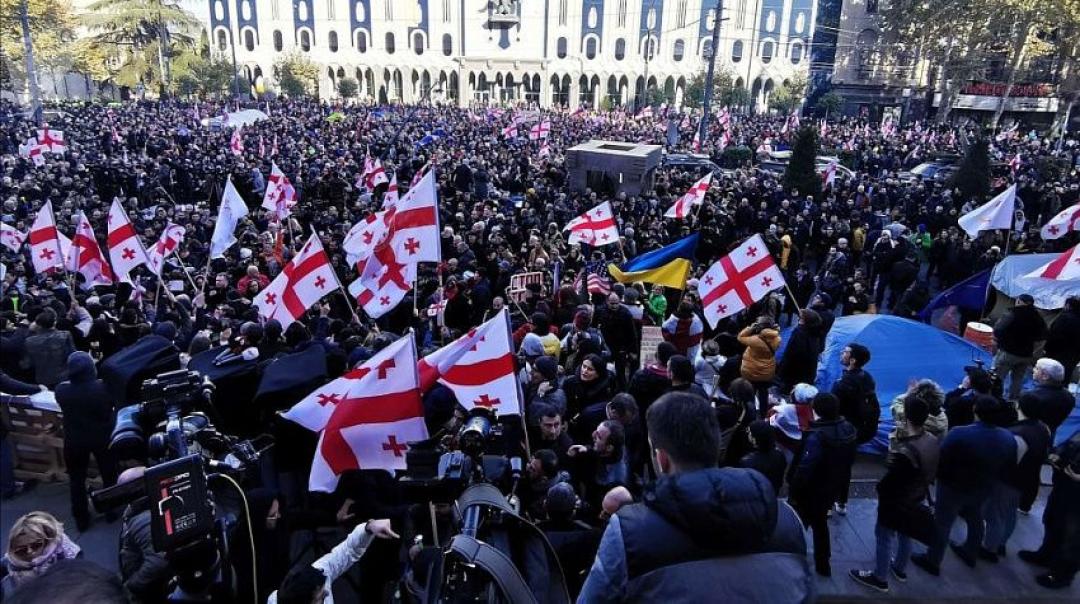
Two opposition protests held in Georgia

On 17 November, two opposition-led rallies were held in the Georgian capital of Tbilisi following the failure of a bill which would introduce the proportional election system in the country (Caucasus Watch reported).
The first faction included the United National Movement (UNM), European Georgia, Labour Party, Democratic Movement-United Georgia, Lelo and Girchi, who demonstrated in front of the Georgian parliament. They blocked the entrances to the parliament of Georgia with tents.
In his address in front of the parliament, the European Georgia chairman Davit Bakradze said that their main goal was “to put a huge political full stop to the Georgian Dream and [its chairman] Bidzina Ivanishvili”. “We will do that by all means, because today the Georgian society [has been] cheated, because the Georgian society is angry,” he said, adding that the European Georgia would boycott parliamentary activities until the ruling party keeps its promise to change the electoral system from 2020 onwards. Another member of European Georgia, Gigi Ugulava was chained and padlocked to one of the gates of the Parliament. He said that the padlock key will be given to the people.
Some demonstrators temporarily left the area around Parliament to protest in front of the office of the Georgian Dream. A minor clash took place between these protestors and the police when the officers prevented them from writing ‘Change’, ‘Go’, and ‘The System Must be Destroyed’ on the asphalt in front of the party headquarters.
The other protest faction was led by the Alliance of Patriots, which gathered at the Republic Square at and demanded the ruling party’s resignation. They were joined by several nationalist groups, including businessman Levan Vasadze and the Georgian March. The Alliance of Patriots leader Irma Inashvili said the government should “make a compromise” and introduce the proportional election system starting in 2020.
According to the report by the Chief of Patrol Police Vazha Siradze, 5,000 civilians were gathered around the Parliament building and approximately 1,500 activists demonstrated at the Alliance of the Patriots protest near the First Republic Square, both in Tbilisi. While 50 people showed up at the organized protest in Batumi. The Reuters version in contrast claimed that “about 20,000 people rallied in the centre of Tbilisi to protest against the government and to demand an early parliamentary election.”
Meanwhile, the number of parliamentary deputies who left the ruling bloc in the parliament grew to 12. The day after the protests, Georgian Dream members gathered in the party’s central office in order to respond to the protest demands. Secretary General of the ruling party, Tbilisi Mayor Kakha Kaladze stated after the meeting that the 2020 parliamentary elections will be held with a mixed-electoral system. “Less than a year is left before the Elections. We are not going to discuss any new initiatives regarding the electoral system. Yesterday, everyone saw clearly that the United National Movement, with its branches, was the true organizer of the protest. The known reason for this rally is the demand for a proportional electoral system, but the real goal is the destruction of the political process,” he said, adding that public trust and support win elections, not electoral systems.
After the bill failed, Georgian Prime Minister Giorgi Gakharia assured that the country would have a proportional system starting from 2024. He also stated that everyone in Georgia has the freedom of expression and the state will ensure that right.
Georgian President Salome Zourabichvili called on the ruling party and opposition to avoid “a new wave of destabilisation”. She said that the people were interested “in fairness and transparency of the elections, as it should be” and in order to reveal the free will and the choice of the Georgian society, “we need an utmost composure for the upcoming parliamentary elections”. She also said that “it is very unfortunate that such a loudly voiced initiative, which echoed the international community’s recommendations and was positively assessed by it, could not be (or was not) brought to its successful completion”. “However, regardless of how the ongoing processes in Parliament are evaluated, it should be said that this is neither an insoluble obstacle for the country, nor is it the end of democracy”, she concluded.
Speaking to Vestnik Kavkaza, Georgian political analyst Gela Vasadze said that the parliamentarians who voted against the bill, did not do it on their own free will, but were convinced by the party’s chairperson Bidzina Ivanishvili. “The problem is that the authorities have promised a transition from a mixed system to a proportional voting system for many years. A mixed system always let[s] the ruling party win. And today Bidzina Ivanishvili found himself in the same position as in 2016, when it was necessary to create the appearance of what Western partners call procedural democracy, because it is impossible for a democratic country always have the same party in power. In my opinion, the vote failed because Ivanishvili at some point realized that he would not be able to create reliable satellite parties in a fairly short period of time. Therefore, it was decided to leave things as they are for the 2020 parliamentary elections,” he said.
See Also


Simonyan: “Armenia Should Trade with Turkey and Azerbaijan Instead of Closing Borders”

Mirzoyan Meets US Deputy Assistant Secretary Joshua Huck

Azerbaijani President Holds Talks with UAE and German Business Delegations on Economic Cooperation

Grigoryan Confirms Armenia’s Readiness to Dissolve OSCE Minsk Group Upon Peace Treaty Signing

